Nepal among the first countries in Asia to receive COVID-19 vaccines from COVAX Facility
07 March 2021
- The COVID-19 vaccines delivered by COVAX will contribute to the Government of Nepal’s efforts to vaccinate some of the most vulnerable people across Nepal
Today, Nepal received its first consignment of COVID-19 vaccine doses shipped through the COVAX Facility, a partnership between CEPI, Gavi, UNICEF and WHO, made possible through generous donor support from governments, international organizations, foundations and the private sector. The delivery of COVAX-procured vaccines to Nepal is part of a historic step towards ensuring equitable distribution of COVID-19 vaccines globally, in what will be the largest vaccine procurement and supply operation in history.
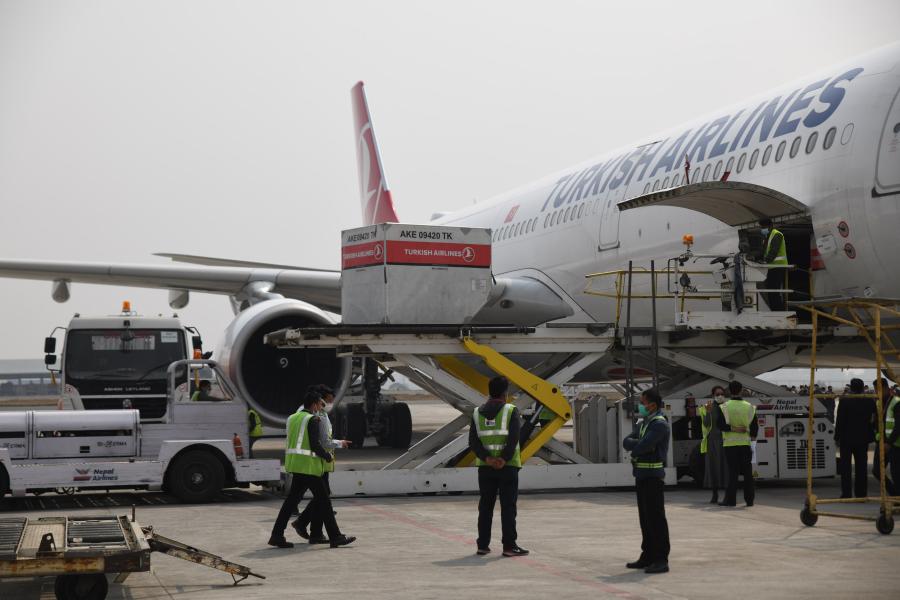
The goal of the COVAX Facility is to supply Nepal with enough doses to vaccinate 20% of the population depending on funding availability. Under the first COVAX allocation, the COVAX Facility will deliver 1.92 million vaccine doses to Nepal by the end of May 2021, in support of the Government of Nepal’s nation-wide vaccination campaign.
Today, the first COVAX shipment of 348,000 doses of AstraZeneca ‘Covishield’ vaccines manufactured by the Serum Institute of India (SII), together with 350,000 syringes and 3500 vaccine safety boxes arrived in Kathmandu before being distributed to provinces and municipalities across the country. COVAX-supported vaccines provide a critical contribution to the Government of Nepal’s National Deployment and Vaccination Plan (NDVP) target to vaccinate roughly 22 million people, among them refugees, migrant returnees and other migrant populations. With the generous contribution of the Government of India, Nepal was able to commence the vaccination campaign and to date, 429,705 people have been vaccinated.
The COVAX Facility is generously funded by partner governments, including the Governments of Australia, Finland, France, Germany, Japan, Korea, Norway, Qatar, Saudi Arabia, Switzerland, the United Kingdom, the United States and the European Union as well as foundations and corporations
The arrival of the COVAX supplied vaccines will boost Nepal’s vaccination efforts as it coincides with the launch of the second phase of the vaccination campaign which targets those who are most vulnerable to developing severe illness from COVID-19 including the elderly and people with comorbidities. The second phase will also target teachers, as part of the expanded group of frontline workers.
Ongoing public health measures to prevent the transmission of COVID-19 will continue to be critical alongside vaccination. This includes adhering to testing and quarantine measures, mask wearing, hand hygiene, and physical distancing of at least two meters.
Representatives of the COVAX technical and funding partners joined the Minister of Health and Population, His Excellency Hridayesh Tripathi, in welcoming the global COVAX contribution to Nepal’s COVID-19 vaccination efforts at Tribhuvan International Airport in Kathmandu.
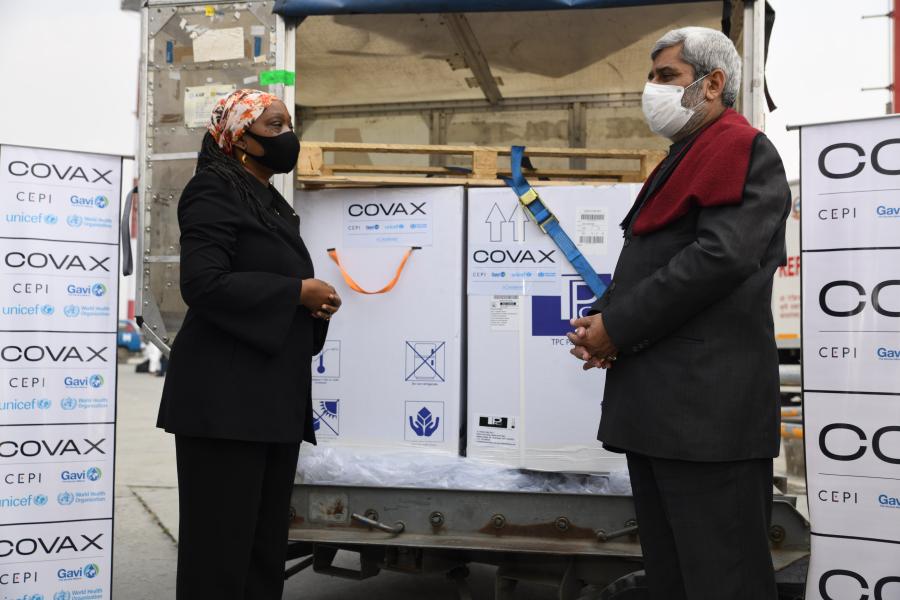
Development partners congratulated Nepal for being among the first countries in the world to have launched COVID-19 vaccination efforts in January 2021. They reiterated their solidarity with Nepal, as exemplified by the arrival of the first COVAX vaccine contribution.
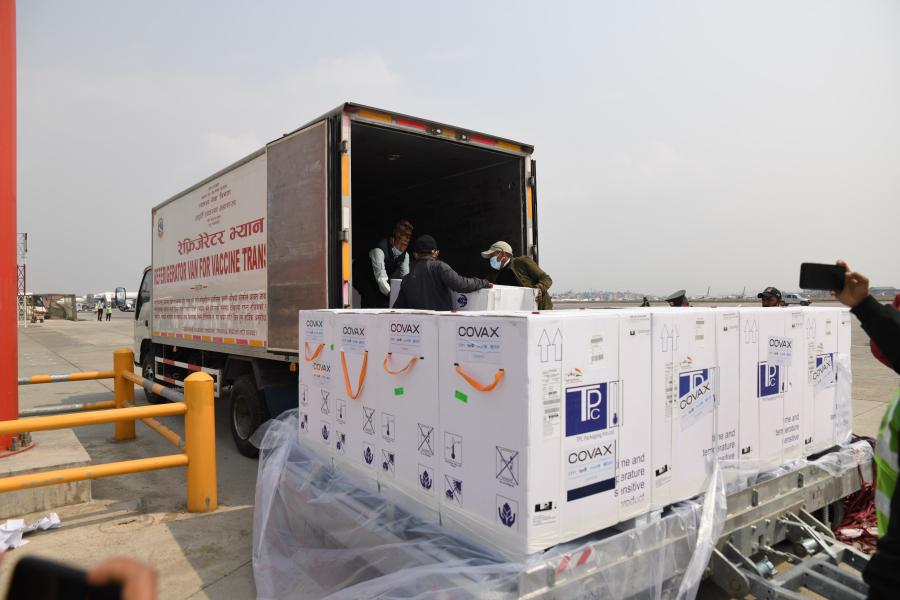
Nepal’s development partners are committed to working with Nepal through the pandemic recovery period to ensure that no one is left behind. Supporting the vaccination of everyone living in Nepal through COVAX will go a long way to restoring normalcy, preventing the loss of social and economic gains made and paving the way for socio-economic recovery.
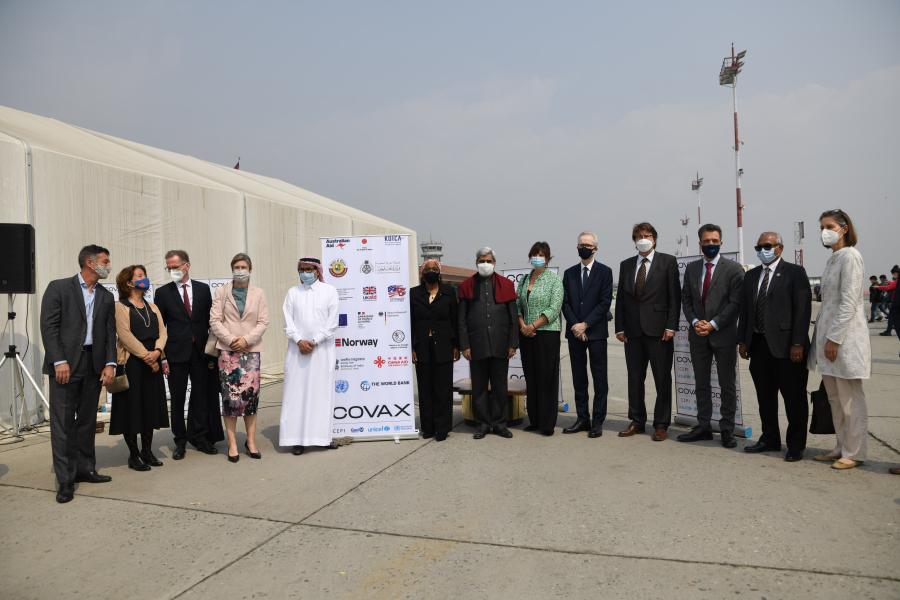
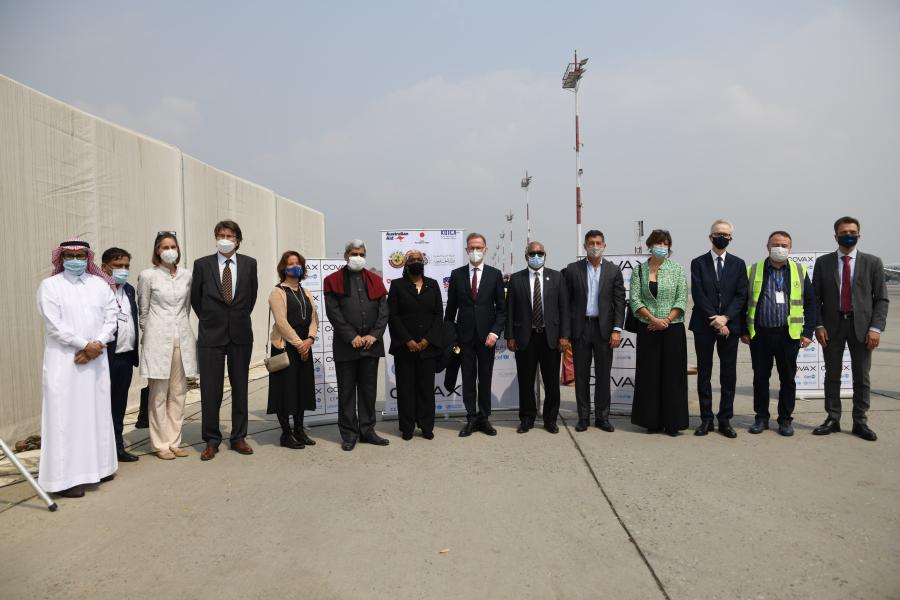
Please see list of COVAX donor partners and pledges at: https://www.gavi.org/sites/default/files/covid/covax/COVAX-AMC-Donors-Table.pdf


Media contacts
UNICEF country office
| Tania Dhakhwa |
| +977 980 1244524 |
| tdhakhwa@unicef.org |
WHO country office
| Mr. Sujan G. Amatya |
| samatya@who.int |
| Communications Officer, UN House, Pulchowk |
| Tel. +977-1-5523200; Extension: 1337 |
CEPI Press office
| Telephone: +44 7387 055214 |
| Email: press@cepi.net |
GAVI
| Meghana Sharafudeen msharafudeen@gavi.org |
| Iryna Mazur imazur@gavi.org |
| Evan O'Connell econnell@gavi.org |
| Laura Shevlin lshevlin@gavi.org |
Notes to Editors
List of donor pledges to the Gavi COVAX AMC is available here.
Interactive funding tracker for the ACT Accelerator, which includes details of funding for COVAX, can be found here.
About COVAX
COVAX, the vaccines pillar of the Access to COVID-19 Tools (ACT) Accelerator, is co-led by the Coalition for Epidemic Preparedness Innovations (CEPI), Gavi, the Vaccine Alliance Gavi) and the World Health Organization (WHO) – working in partnership with developed and developing country vaccine manufacturers, UNICEF, the World Bank, and others. It is the only global initiative that is working with governments and manufacturers to ensure COVID-19 vaccines are available worldwide to both higher-income and lower-income countries.
CEPI is focused on the COVAX vaccine research and development portfolio: investing in R&D across a variety of promising candidates, with the goal to support development of three safe and effective vaccines which can be made available to countries participating in the COVAX Facility. As part of this work, CEPI has secured first right of refusal to potentially over one billion doses for the COVAX Facility to a number of candidates, and made strategic investments in vaccine manufacturing, which includes reserving capacity to manufacture doses of COVAX vaccines at a network of facilities, and securing glass vials to hold 2 billion doses of vaccine. CEPI is also investing in the ‘next generation’ of vaccine candidates, which will give the world additional options to control COVID-19 in the future.
Gavi is focused on procurement and delivery for COVAX: coordinating the design, implementation and administration of the COVAX Facility and the Gavi COVAX AMC and working with its Alliance partners UNICEF and WHO, along with governments, on country readiness and delivery. The COVAX Facility is the global pooled procurement mechanism for COVID-19 vaccines through which COVAX will ensure fair and equitable access to vaccines for all 190 participating economies, using an allocation framework formulated by WHO. The COVAX Facility will do this by pooling buying power from participating economies and providing volume guarantees across a range of promising vaccine candidates. The Gavi COVAX AMC is the financing mechanism that will support the participation of 92 low- and middle-income countries in the Facility, enabling access to donor-funded doses of safe and effective vaccines. Gavi is fundraising for the COVAX AMC, and funding UNICEF procurement of vaccines as well as partners’ and governments work on readiness and delivery, including support cold chain equipment, technical assistance, syringes, vehicles, and other aspects of the vastly complex logistical operation for delivery. UNICEF and the Pan-American Health Organisation (PAHO) will be acting as procurement coordinators for the COVAX Facility, helping deliver vaccines to COVAX AMC participants and others.
WHO has multiple roles within COVAX: It provides normative guidance on vaccine policy, regulation, safety, R&D, allocation, and country readiness and delivery. Its Strategic Advisory Group of Experts (SAGE) on Immunization develops evidence-based immunization policy recommendations. Its Emergency Use Listing (EUL)/prequalification programmes ensure harmonized review and authorization across member states. It provides global coordination and member state support on vaccine safety monitoring. It developed the target product profiles for COVID-19 vaccines and provides R&D technical coordination. WHO leads, along with UNICEF, the support to countries as they prepare to receive and administer vaccines. The Country Readiness and Delivery (CRD) workstream includes Gavi and numerous other partners working at the global, regional, and country-level to provide tools, guidance, monitoring, and on the ground technical assistance for the planning and roll-out of the vaccines. Along with COVAX partners, WHO is also developing a no-fault compensation scheme as part of the time-limited indemnification and liability commitments.
UNICEF is leveraging its experience as the largest single vaccine buyer in the world and working with manufacturers and partners on the procurement of COVID-19 vaccine doses, as well as freight, logistics and storage. UNICEF already procures more than 2 billion doses of vaccines annually for routine immunization and outbreak response on behalf of nearly 100 countries. In collaboration with the PAHO Revolving Fund, UNICEF is leading efforts to procure and supply doses of COVID-19 vaccines for COVAX. In addition, UNICEF, Gavi and WHO are working with governments around the clock to ensure that countries are ready to receive the vaccines, with appropriate cold chain equipment in place and health workers trained to dispense them. UNICEF is also playing a lead role in efforts to foster trust in vaccines, delivering vaccine confidence communications and tracking and addressing misinformation around the world.
About CEPI
CEPI is an innovative partnership between public, private, philanthropic, and civil organisations, launched at Davos in 2017, to develop vaccines to stop future epidemics. CEPI has moved with great urgency and in coordination with WHO in response to the emergence of COVID-19. CEPI has initiated 11 partnerships to develop vaccines against the novel coronavirus. The programmes are leveraging rapid response platforms already supported by CEPI as well as new partnerships.
Before the emergence of COVID-19, CEPI’s priority diseases included Ebola virus, Lassa virus, Middle East Respiratory Syndrome coronavirus, Nipah virus, Rift Valley Fever and Chikungunya virus. CEPI also invested in platform technologies that can be used for rapid vaccine and immunoprophylactic development against unknown pathogens (Disease X).
About Gavi
Gavi, the Vaccine Alliance is a public-private partnership that helps vaccinate half the world’s children against some of the world’s deadliest diseases. Since its inception in 2000, Gavi has helped to immunise a whole generation – over 822 million children – and prevented more than 14 million deaths, helping to halve child mortality in 73 developing countries. Gavi also plays a key role in improving global health security by supporting health systems as well as funding global stockpiles for Ebola, cholera, meningitis and yellow fever vaccines. After two decades of progress, Gavi is now focused on protecting the next generation and reaching the unvaccinated children still being left behind, employing innovative finance and the latest technology – from drones to biometrics – to save millions more lives, prevent outbreaks before they can spread and help countries on the road to self-sufficiency. Learn more at www.gavi.org and connect with us on Facebook and Twitter.
The Vaccine Alliance brings together developing country and donor governments, the World Health Organization, UNICEF, the World Bank, the vaccine industry, technical agencies, civil society, the Bill & Melinda Gates Foundation and other private sector partners. View the full list of donor governments and other leading organizations that fund Gavi’s work here.
About WHO
The World Health Organization provides global leadership in public health within the United Nations system. Founded in 1948, WHO works with 194 Member States, across six regions and from more than 150 offices, to promote health, keep the world safe and serve the vulnerable. Our goal for 2019-2023 is to ensure that a billion more people have universal health coverage, to protect a billion more people from health emergencies, and provide a further billion people with better health and wellbeing.
For updates on COVID-19 and public health advice to protect yourself from coronavirus, visit www.who.int and follow WHO on Twitter, Facebook, Instagram, LinkedIn, TikTok, Pinterest, Snapchat, YouTube
About UNICEF
UNICEF works in some of the world’s toughest places, to reach the world’s most disadvantaged children. Across 190 countries and territories, we work for every child, everywhere, to build a better world for everyone. For more information about UNICEF and its work for children, visit www.unicef.org. For more information about COVID-19, visit www.unicef.org/coronavirus . Find out more about UNICEF’s work on the COVID-19 vaccines here, or about UNICEF’s work on immunization here.
Follow UNICEF on Twitter and Facebook.
About the ACT-Accelerator
The Access to COVID-19 Tools ACT-Accelerator, is a new, ground-breaking global collaboration to accelerate the development, production, and equitable access to COVID-19 tests, treatments, and vaccines. It was set up in response to a call from G20 leaders in March and launched by the WHO, European Commission, France and The Bill & Melinda Gates Foundation in April 2020.
The ACT-Accelerator is not a decision-making body or a new organisation, but works to speed up collaborative efforts among existing organisations to end the pandemic. It is a framework for collaboration that has been designed to bring key players around the table with the goal of ending the pandemic as quickly as possible through the accelerated development, equitable allocation, and scaled up delivery of tests, treatments and vaccines, thereby protecting health systems and restoring societies and economies in the near term. It draws on the experience of leading global health organisations which are tackling the world’s toughest health challenges, and who, by working together, are able to unlock new and more ambitious results against COVID-19. Its members share a commitment to ensure all people have access to all the tools needed to defeat COVID-19 and to work with unprecedented levels of partnership to achieve it.
The ACT-Accelerator has four areas of work: diagnostics, therapeutics, vaccines and the health system connector. Cross-cutting all of these is the workstream on Access & Allocation.

